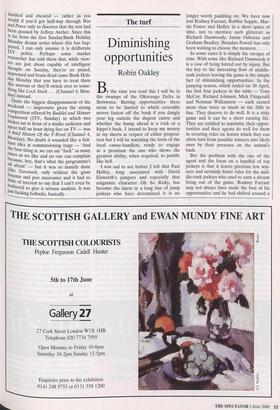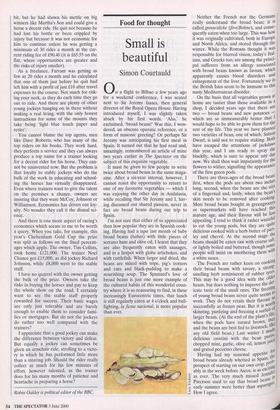The turf
Diminishing opportunities
Robin Oakley
By the time you read this I will be in the swamps of the Okavango Delta in Botswana. Betting opportunities there seem to be limited to which crocodile moves fastest off the bank if you dangle your leg outside the dugout canoe and whether the hump ahead is a rock or a hippo's back. I intend to keep my money in my shorts in respect of either proposi- tion but I will be watching the form of the local canoe-handlers, ready to engage at a premium the one who shows the greatest ability, when required, to paddle like hell.
I was sad to see before I left that Paul Holley, long associated with David Elsworth's jumpers and especially that enigmatic character Oh So Risky, has become the latest in a long line of jump jockeys who have determined it is no longer worth paddling on. We have now lost Rodney Farrant, Robbie Supple, Mar- tin Foster and Holley in a short space of time, not to mention such glitterati as Richard Dunwoody, Jamie Osborne and Graham Bradley. Brendan Powell has only been waiting to choose the moment.
In some cases it is simply the ravages of time. With some like Richard Dunwoody it is a case of being forced out by injury. But the key to the increasing flow of middle- rank jockeys leaving the game is the simple fact of diminishing opportunities. In the jumping season, which ended on 30 April, the first four jockeys in the table — Tony McCoy, Richard Johnson, Mick Fitzgerald and Norman Williamson — each earned more than twice as much as the fifth in line. They deserve to do well. It is a risky game and it can be a short earning life. They are entitled to maximise their oppor- tunities and their agents do well for them in securing rides on horses which they can often turn from possible winners into likely ones by their presence on the animal's back.
But the problem with the rise of the agent and the focus on a handful of top jockeys is that it leaves precious few win- ners and certainly fewer rides for the mid- dle-rank jockeys who used to earn a decent living out of the game. Rodney Farrant may not always have made the best of his opportunities and he had shifted around a bit, but he had shown his mettle on big winners like Martha's Son and could give a horse a decent ride. He quit not because he had lost his bottle or been crippled by injury but because it was not economic for him to continue unless he was getting a minimum of 30 rides a month at the cur- rent riding fee of £90.40 (it is £65.55 on the flat, where opportunities are greater and the risks of injury smaller).
As a freelance, Farrant was getting as few as 20 rides a month and he calculated that one of them just before he quit had left him with a profit of just £18 after travel expenses to the course. Not much for risk- ing your neck, as they do each time they go out to ride. And there are plenty of other young jockeys hanging on in there without making a real living, with the only honest instructions for some of the mounts they take being 'light blue touch paper and retire'.
You cannot blame the top agents, men like Dave Roberts, who has many of the top riders on his books. They work hard, they perform a service and they can always produce a top name for a trainer looking for a decent rider for his horse. They can- not be uninvented now. But the problem is that loyalty to stable jockeys who do the bulk of the work in educating and school- ing the horses has virtually disappeared. Even where trainers want to give the talent on the premises a chance, owners are insisting that they want McCoy, Johnson or Williamson. Economics has driven out loy- alty. No wonder they call it the dismal sci- ence.
And there is one more aspect of racing's economics which seems to me to be worth a query. When you take, for example, this year's Cheltenham Gold Cup the prize was split as follows on the fixed percent- ages which apply. The owner, Tim Collins, took home £121,000. The trainer Noel Chance got £15,000, as did jockey Richard Johnson, while £8,000 went to the stable staff.
I have no quarrel with the owner getting the bulk of the prize. Owners take the risks in buying the horses and pay to keep the whole show on the road. I certainly want to see the stable staff properly rewarded for success. Their basic wages are only just tolerable and are barely enough to enable them to consider fami- lies or mortgages. But do not the jockeys do rather too well compared with the trainers?
I appreciate that a good jockey can make the difference between victory and defeat. But equally a jockey can sometimes be given an armchair ride, strolling to a victo- ry in which he has performed little more than a steering job. Should the rider really collect as much for his few minutes of effort, however talented, as the trainer does for his many months of patience and heartache in preparing a horse?
Robin Oakley is political editor of the BBC.






































































 Previous page
Previous page